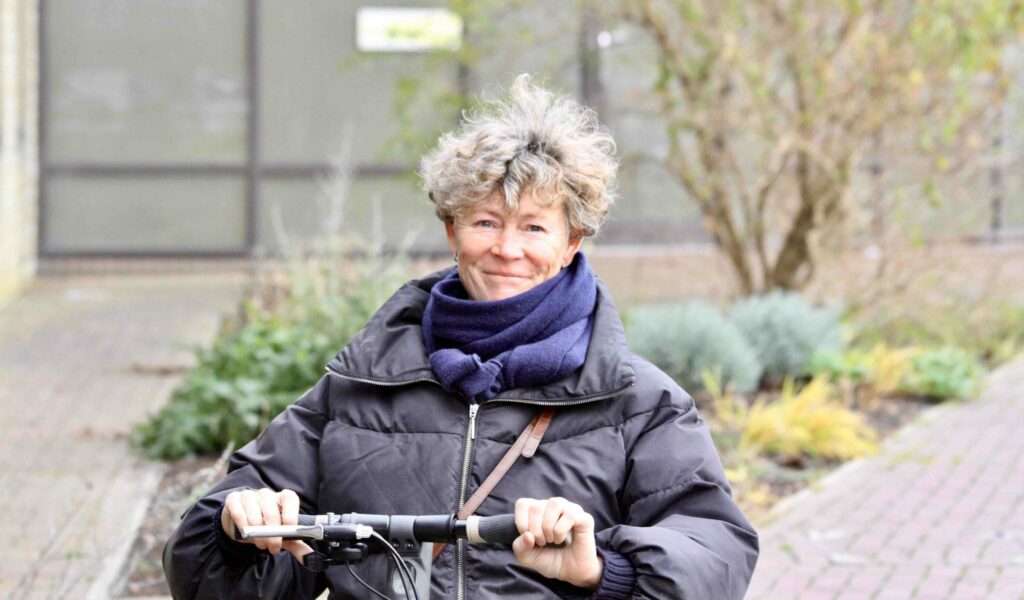
2023 Pathfinder Projects
Published:
Meet eleven projects supported through our 2023 Pathfinder Innovation Programme, from the design of a more intuitive navigation for a self-balancing mobility vehicle, to an audio-led navigation app, and an AI-powered community facilitator.
We are pleased to share the innovative projects that have come through the 2023 Pathfinder Innovation Programme. The eleven commercially viable products and services have been designed with the goal of enabling individuals and communities to maintain an active and joyful life at every age.
Based at the Royal College of Art’s Battersea campus, Design Age Institute was set up to provide design support for Pathfinder Projects; accelerating an innovative idea for healthy ageing from a prototype towards market. The Institute provides and facilitates seed funding for design, user research, opportunity scoping and mentoring, as well as connecting projects with design experts. The Pathfinder Innovation Programme has been made possible through the generous support of UK Research and Innovation (UKRI) Healthy Ageing Challenge, delivered by Innovate UK, the UK’s national innovation agency and Research England.
“One of the biggest frustrations of my career to date is witnessing how few potential entrepreneurs manage to get their ideas to market, and as such fail to deliver real and lasting benefit to their intended audience. It has been a joy to lead Design Age Institute’s Pathfinder Programme which helps overcome some of the barriers that entrepreneurs face, while at the same time demonstrating how great British design can help innovators connect with users, solve problems and communicate benefits making ideas more real, less risky and ultimately more investable.”
Colum Lowe, Director, Design Age Institute
From mobility scooters to navigation systems, the 2023 projects focus on key themes including Transport and Mobility, to support improved health, well-being and connection for ageing communities. They all demonstrate the significant impact of investment in good design in supporting happier and healthier ageing.
A full list of Pathfinder projects can be found here.
The 2023 programme of Pathfinder projects includes:

Making the Centaur more Intuitive by Centaur Robotics
The Centaur is a revolutionary self-balancing, two-wheeled personal electric vehicle which keeps older people socially engaged and lets them live at home for longer. Centaur Robotics has been working to optimise the design of the control system of its ground-breaking self-balancing chair for older users, the Centaur. The research into creating a more intuitive and easy-to-use design for older users will lead to better and more intuitive controls of the Centaur, and has helped to develop the ‘human-machine interface’, taking into account the cognitive and physical considerations of older adults. As well as helping older people, the Centaur can empower up to 10% of the population who cannot walk 400 metres unaided.
Waymap Newcastle by Waymap
Waymap has developed a wayfinding technology mobile application for those with or without visual impairments that works in both indoor and outdoor settings without the need for physical infrastructure (GPS and WIFI). The app is designed with accessibility in mind; with buttons, search fields and service flow designed to operate smoothly when voice-over accessibility is enabled on the phone. Waymap supports the confidence, independence, and mobility of its users by providing turn-by-turn navigation with an accuracy of up to 1 metre to support users to travel independently using only a smartphone.
Squiboon by Play Well For Life
Credit: Squiboon by Playwell for Life
Squiboon is a device that uses cutting-edge AI technology delivered through the familiar medium of a TV to facilitate structured and inclusive face-to-face group conversations to combat loneliness and isolation of older adults in housing, care and community settings. The playful interactions facilitated through the device, combined with the power of generative AI and speech recognition create more equitable conversations building a more cohesive participatory community among residents, improving health and well-being.
The Shuffler by Trainor Jim

Credit: The Shuffler, Trainor Jim
The “Shuffler®” is a UK patented, portable, lightweight, affordable and easy-to-use piece of exercise equipment specifically designed to be used whilst seated, transforming personal mobility for older users. As we age many of us struggle to keep mobile because of fears about pain, stiffness and balance. Optimising the Shuffler allows older or frail individuals to maintain or enhance mobility by removing barriers to exercise. Co-invented by an NHS GP it is hoped that this device will also be a gamechanger for falls prevention and early rehab in Health and Social Care settings.
BriteWay-XR by Briteyellow Limited
Credit: BriteWay-XR by Briteyellow Limited
BriteWay-XR is a connected guidance app and web portal that enables safer, and more accessible journeys for all. It allows older people or those with reduced mobility, to plan their journeys more effectively, and travel independently with confidence. Using virtual reality and augmented reality navigation with indoor position tracking, BriteWay provides the assurance of real-time support from staff or family and friends, whilst allowing independent travel with confidence. Real-time accessibility information and intelligent routing are used to reassure and route people in a way that avoids overcrowding and provides guidance through complex interchanges. The app will shortly launch to market with Transport for Wales.
ICICLES-EV by Hanger 19
ICICLES-EV (Innovative Cable Improving Charging Limitations Excluding Seniors from EVs) is a new electric vehicle charging cable/gun targeted at those with mobility impairments which simplifies the process of moving and connecting the cable. It is a lightweight version with an innovative design which reduces the amount of force required to successfully plug in a vehicle. It helps those with mobility impairments but aims to set the standard for all charging cables. It provides an opportunity to help more people convert to EVs without the worry about issues of being able to use public charging infrastructure.
Invisible Creations by PROCare

Invisible Creations are inclusive, attractive, and dual-purpose mobility products to support people to live well and maintain independence for longer. Their outdoor mobility products are combined with everyday garden items, like plant pots and window boxes, to disguise grab rails. Invisible Creations enable safe and supported access to the outdoors while promoting active mobility and preventing falls, without compromising on dignity and style.
The 3Scooter by Supersmith
Credit: The 3Scooter by Supersmith
The 3Scooter is a revolutionary mobility scooter that uses adaptive robotics to solve the inherent flaw in all scooters: a lack of stability. It self-levels for improved safety, is lightweight and affordable, and seats riders at 90% of standing height, overcoming negative social dynamics associated with low sitting positions. The design transforms how the 3Scooter interacts with both the rider and the terrain, ensuring a safer and more agile ride. Capable of overcoming slopes, cambers and bumps, it brings the empowering benefits of mobility to more people with walking difficulties.
Eyecatcher by Irida Health
Eyecatcher is a first-of-its-kind, smartglasses system that empowers glaucoma patients to measure their own vision at home, enabling timely interventions (e.g. surgery, drugs, laser) which can preserve sight. Glaucoma is a chronic eye disease, and if left untreated can lead to severe, irreversible sight loss. Regular, lifelong monitoring is therefore vital. Eyecatcher allows for ‘hospital-grade’ vision assessments to be performed at home and uploaded automatically for clinical review. With ageing populations and therefore increases in those experiencing Glaucoma, hospital-only vision assessments are increasingly unsustainable, whereas Eyecatcher allows for greater regularity, convenience, and at a fraction of the cost.
Inclusive Wayfinding Toolkit by Applied Information Group
Inclusive Wayfinding Toolkit is a national walking and cycling wayfinding system for active travel on foot or on wheels, that specifically addresses the needs and aspirations of a diverse ageing marketplace. The Inclusive Wayfinding Toolkit aims to enable mobility, socialisation, and access to local services, alongside generating connection and ensuring safety and confidence in the public who use it.
BelleVie by Bellevie Care
BelleVie is an innovative, people-powered platform that empowers and elevates care workers, and helps more people access the support they need to live independently at home for longer. The BelleVie model is formed of 10-person self-managing teams underpinned by the Wellbeing Operating System (OS), a bespoke technology platform, which is effective, efficient and scalable, cutting down on unnecessary admin so that carers can focus on caring, providing continuity of high-quality care built on trusted relationships.
About Design Age Institute
Based at the Royal College of Art’s (RCA) Helen Hamlyn Centre for Design (HHCD), Design Age Institute (DAI) was established in 2020 to support the UK Government’s Grand Challenge on an Ageing Society. Funded in 2020 by Research England, Design Age Institute partnership brings together skills and expertise from world-leading organisations in research, design, innovation and learning – the UK’s National Innovation Centre for Ageing at Newcastle University, the Oxford Institute of Population Ageing, the International Longevity Centre and Design Museum.
About the Royal College of Art
Founded in 1837, the Royal College of Art is the world’s leading university of art and design. Specialising in teaching and research, the RCA offers degrees of MA, MPhil, MFA, MDes, MArch, MEd, MRes, Graduate Diploma and PhD across the disciplines of architecture, arts & humanities, design and communication.
A small, specialist and research-intensive postgraduate university based in the heart of London, the RCA provides around 2,800 students with unrivalled opportunities to deliver art and design projects that transform the world.
The RCA’s approach is founded on the premise that art, design, creative thinking, science, engineering and technology must all collaborate to solve today’s global challenges.
The RCA is home to more than 850 of the world’s leading academic and professional staff who teach and develop students in 34 academic programmes. RCA students are exposed to new knowledge in a way that encourages them to experiment.
The RCA runs joint courses with Imperial College London and the Victoria & Albert Museum.
InnovationRCA, the university’s centre for enterprise, entrepreneurship, incubation and business support, has helped over 81 RCA business ideas become a reality that has led to the creation of over 800 UK jobs.
Alumni include such major figures as Dame Barbara Hepworth, Bridget Riley, Henry Moore OM, David Hockney OM, Sir Peter Blake, Sir Ridley Scott, Dame Zandra Rhodes, Sir Frank Bowling, Sir James Dyson OM, Tracey Emin RA CBE, Chris Ofili CBE, Sir Anthony Finkelstein, Francesca Amfitheatrof, Erdem Moralıoğlu MBE, Bianca Saunders and Thomas Heatherwick CBE RDI.
The RCA was named the world’s leading university of art and design in the QS World Rankings 2023 for the ninth consecutive year (QS World Subject Rankings 2015-2023).

